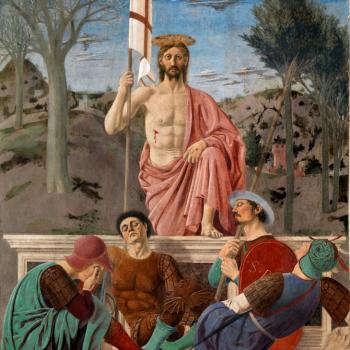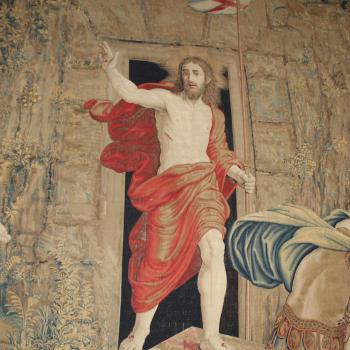Just Breathe and Embrace Your Doubts! – The Second Sunday of Easter – April 19, 2020
Bruce G. Epperly
John 20:19-31
This year, I will be preaching from these scriptures on April 19 (John 20:19-23) and April 26 (John 20:24-31) from the comfort of my home. I believe these passages are important in this time of pandemic. We need the breath of God. We also need to respond creatively to our doubts regarding God’s presence in this time of danger and opportunity. You may choose otherwise, but I see the lectionary as a living document, adaptable to our pastoral context.
I.
And Jesus breathed on them, and said, “Receive the Holy Spirit.” For the past six weeks, we have been holding our breath. We have been worried about other people’s breath. We are waiting to exhale.
Experiencing God’s healing and enlivening breath is a form of spiritual CPR. God’s breath is something we want to hear personally, and in our churches, especially as we sheltering in place, distant from one another, trying to find community online and on the phone and facetime.
The Spirit blows where it wills and wherever it blows, it brings new life and vitality. We need that spirit-filled experience just as those women and men gathered in an upper room needed not only to hear that Jesus was risen, but rise themselves through spiritual resuscitation. God’s breath brings us back to life and sets us on a path of healing and spiritual transformation. We need new life, spiritual CPR, to respond to our fears and anxieties over personal and institutional survival.
In the biblical world, breath is a manifestation of God’s Spirit: God breathes over the waters and the universe takes form; God revives dry bones in a valley; and the Psalmist proclaims, “Let everything that breathes praise God.” (Psalm 150:6) Spirit moves through Jerusalem on Pentecost and gives birth to a new manifestation of the Jesus movement, the lively spirit-centered movement that we know as the church. God’s Spirit still breathes through us as the source of possibility and the energy to achieve God’s vision in our time.
Could Jesus’ animating energy still be reviving the world? Is it possible for us to breathe some of the same molecules – in homeopathic form – that Jesus breathed in upper room, giving his followers spiritual resuscitation? Can we healthfully breathing the same molecules of members of our congregation?
Deep breathing brings peace. The passage calls pastor and congregants to breathe deeply God’s presence, letting deep breaths center us, chase away unnecessary anxiety, and fill us with courage despite our concerns. A breath prayer is appropriate for this week’s online worship service.
II.
We need breathing space and it is a credit to the disciples that they gave Thomas breathing space, and allowed him to live with his questions. They apparently did not pick on him or ostracize him for doubt of the resurrection. Perhaps they understood that you need to see it to believe it. Thomas missed out on the spiritual revival of the upper room; and wanted proof that Jesus was alive. His quest was not just intellectual, it was experiential and spiritual. He wanted to see Jesus, feel his breath, and touch his body. He wanted the real presence of the risen Jesus not just talk about it. When Jesus returns to the group, Thomas is amazed and transformed, and he can breathe again.
Legend has it that Thomas brought the gospel to India. Perhaps Thomas alone had the spiritual bandwidth to embrace the wisdom of the rishis and sages and challenge them to embrace the resurrection spirit of the “avatar” Jesus.
The Gospel reading ends with curious and liberating words; words that invite us to be creative and do greater things than we can imagine (John 14:12) John 20:30 proclaims: “Jesus did many other signs in the presence of his disciples, which are not written in this book.” In other words, there is more to Jesus than what we can find on the printed page, even the printed pages of scripture. John doesn’t limit Jesus’ message or the Spirit’s movements to the pages of a book or recitations of doctrinal orthodoxy. The Risen Jesus is always more than we can imagine and never confined by our religious world views.
This is good news, for it says that Christ is still alive and that Christ’s work can never be encompassed by book or creed. As Jesus said to Nicodemus, “The wind blows where it chooses, and you hear the sound of it, but do not know where it comes from or where it goes. So it is with everyone who is born of the Spirit.” (John 3:8) God’s Spirit sets us free; it breathes on us and gives us energy for adventures ahead. It inspires to be God’s companions in our time and place. God’s spirit enables us to have the stature to embrace doubt and certainty, fear and love, tradition and adventure.
III.
Take time to breathe, inhaling and exhaling deeply. Simply breathing your prayers has been shown, according to medical studies, to reduce stress and enhance immune system functioning. It also awakens your connection with creation, breathing in, around, and through you. When we breathe in God’s Spirit, we are contemporaries with Jesus’ first followers, and we can imaginatively – and realistically – hear Jesus say to us as he breathes in us, “Receive the Holy Spirit.” In return, we can affirm, “I breathe God’s Spirit and share God’s energy of love with all creation.”
+++
Bruce Epperly is a Cape Cod pastor, professor, and author of over fifty books including FAITH IN A TIME OF PANDEMIC and GOD ONLINE: A MYSTIC’S GUIDE TO THE INTERNET












